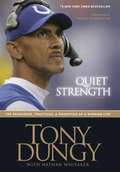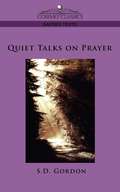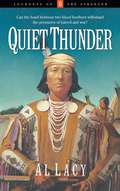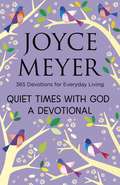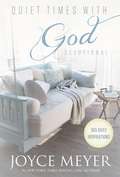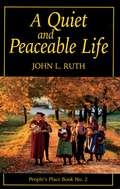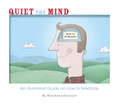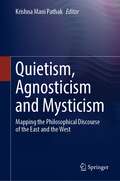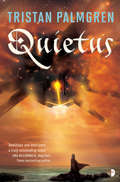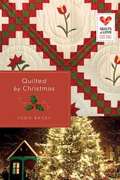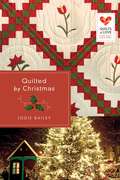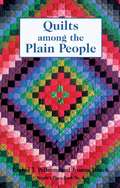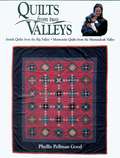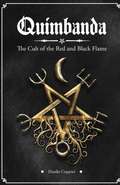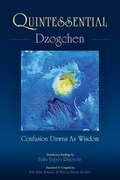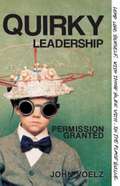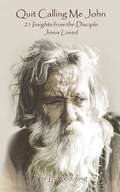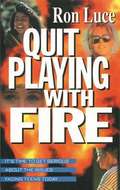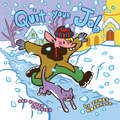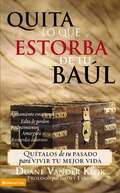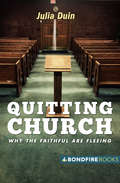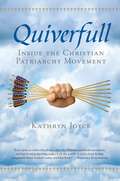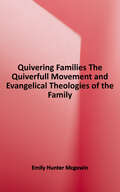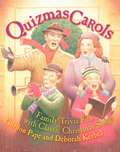- Table View
- List View
Quiet Strength: The Principles, Practices & Priorities of a Winning Life
by Tony Dungy Nathan WhitakerThe first African-American coach to take his team to a Super Bowl victory, Dungy's life and work reflect positive, value-driven, Christian precepts.
Quiet Talks on Prayer (Faith Classics Ser.)
by S. D. GordonYou see sin is slapping God in the face. It may be polished, cultured sin. Sin seems capable of taking quite a high polish. Or it may be the common gutter stuff. A man is not concerned about the grain of a club that strikes him a blow. How can He and I talk together if I have done that, and stick to it-not even apologized. -from "Why the Results Fail" What is prayer? Can humans influence God's will? Why does it seem that many prayers go unanswered? The mysteries of the communication between God and his faithful are explored in this 1904 guide to the power and puzzle of prayer: how God heeds our entreaties, the ideal spirit with which to pray, and even what prayer means in the grand scheme of The Universe. Those who pray will find this a source of comfort and enlightenment even today, a century after it was first published.
Quiet Thunder (Journeys of the Stranger #6)
by Al LacyIn the sixth installment of the Journeys of the Stranger series, legendary hero John Stranger becomes involved in the lives of a brave and skillful Sioux warrior named Quiet Thunder and the white Army captain who has been his blood brother since childhood. Despite the disapproval of both their people, Quiet Thunder and Thane Tyler remain faithfully true to their friendship...both in their hearts and on the battlefield. But when the two must inevitably face each other with weapons drawn, which will win out: love or duty?From the Trade Paperback edition.
Quiet Times With God Devotional: 365 Daily Inspirations
by Joyce MeyerStart your day with peaceful meditations, soulful inspirations, and encouraging Bible verses in this 365-day devotional from bestselling author Joyce Meyer to help you grow spiritually as you spend time with God.Life is busy and often uncertain, but you can live in the full peace of God with this easy-to-understand devotional designed to encourage you each day of the year. This includes a daily Bible verse followed by a devotional reading and power thought to meditate upon.With the constant demands and pressures, it can be hard to regularly take time to unplug and simply be with God. But Joyce's practical teaching format in Quiet Times with God will encourage you to discipline yourself so that you can receive the fullness of God's healing, revitalizing peace.
Quiet Times with God Devotional: 365 Daily Inspirations
by Joyce MeyerStart your day with peaceful meditations, soulful inspirations, and encouraging Bible verses in this 365-day devotional from bestselling author Joyce Meyer -- and grow spiritually as you spend time with God.Life is busy and often uncertain, but you can live in the full peace of God with this easy-to-understand devotional designed to encourage you each day of the year. This includes a daily Bible verse followed by a devotional reading and power thought to meditate upon.With the constant demands and pressures, it can be hard to regularly take time to unplug and simply be with God. But Joyce's practical teaching format in Quiet Times with God will encourage you to discipline yourself so that you can receive the fullness of God's healing, revitalizing peace.
Quiet and Peaceable Life: People's Place Book No.2 (People's Place Book Ser. #2)
by John RuthJohn L. Ruth, a Mennonite storyteller/historian, captures the spirit of Old Order Mennonite and Amish groups in his essays, along with photographs, poetry, and quotations. If the "plain people" of North America are to be understood in terms of their own concerns, we must consider sympathetically their own expressions and the biblical cadences they echo. Having maintained, with the tolerance of their society, a simple life as "the quiet in the land," these folk still prize such passé virtues as modesty, humility, and obedience to God's will, as interpreted by a disciplined community of faith. Their values, difficult to appreciate in a world bemused by progress, are seldom if ever articulated, except as curiosities, in our mass media. --John L. Ruth, in A Quiet and Peaceable Life.
Quiet the Mind
by Matthew JohnstoneIn a world where finding even ten minutes to 'do nothing' can be difficult, the benefits of meditation can be profound. Meditation is simply a way of giving our brains a well-deserved break and can actually help our brains to function healthily and happily. This beautifully illustrated guide is an inspiring and practical book which shows you how to meditate without the need for uncomfortable lotus positions or prayer beads! With his typical gentle and insightful humour, Matthew's guide to meditation will enable to you to feel more present, more youthful, have more energy and greater concentration, improve your mood and sleep more soundly.
Quietism, Agnosticism and Mysticism: Mapping the Philosophical Discourse of the East and the West
by Krishna Mani PathakThis book presents a unique collection of papers on various philosophical aspects of the unknown and unvoiced truth and reality of the cosmic world. It offers a systematic analysis of the three philosophical theories of Quietism, Agnosticism and Mysticism and introduces readers to the fundamentals of mystical knowledge claimed by philosophical schools of the east and the west. It discusses, debates and deliberates on philosophical issues concerning the acquisition of truth, its objectivity and its various dimensions along with the application of thoughts pertaining to Quietism, Agnosticism, and metaphysical-mystic traditions in philosophy. It examines and precisely defines the scope and limits of knowledge, the respective way of life, its expressions and morality, mystical revelation, ineffability of the ultimate, value realism, and faith and reason - with a primary focus on the classical Indian schools of Hinduism, Buddhism, Jainism, Agnosticism, the Bāuls, Greek traditions, modern western meta-philosophy, and contemporary quietist debate in religion and theology. This insightful collection should be of great interest to independent researchers, students and teachers of philosophy, theology, Mysticism and Agnosticism, cultural studies and religious studies.
Quietus (The Unity #1)
by Tristan PalmgrenA transdimensional anthropologist can’t keep herself from interfering with Earth’s darkest period of history in this brilliant science fiction debut Niccolucio, a young Florentine Carthusian monk, leads a devout life until the Black Death kills all of his brothers, leaving him alone and filled with doubt. Habidah, an anthropologist from another universe racked by plague, is overwhelmed by the suffering. Unable to maintain her observer neutrality, she saves Niccolucio from the brink of death. Habidah discovers that neither her home's plague nor her assignment on Niccolucio's world are as she's been led to believe. Suddenly the pair are drawn into a worlds-spanning conspiracy to topple an empire larger than the human imagination can contain.File Under: Science Fiction
Quilted by Christmas
by Jodie BaileyTaryn McKenna believes she's easy to forget. After being abandoned by her parents and left behind when her high school sweetheart joined the army, she vowed to never love again, and threw herself into her love for the outdoors, and the pursuit of a college degree--something no one else in her family had ever accomplished. Her goal, as a young teacher in the hills of North Carolina, is to leave a legacy in the lives of the middle schoolers she teaches. When Taryn's grandmother Jemma, the only other person who ever held her close, has a heart attack that reveals a fatal medical condition, Taryn is corralled into helping grandma work on a final quilting project--an Irish chain quilt that tells the story of her history and the love Jemma knows is out there for Taryn. As the pieces of the quilt come together, Taryn begins to see her value. Can she learn to believe that though others have left her behind, God never will?
Quilted by Christmas
by Jodie BaileyTaryn McKenna believes she's easy to forget. Abandoned by her parents and left behind when her high school sweetheart joined the army, she vows to never love again and throws herself into her love for the outdoors and the pursuit of a college degree--something no one else in her family has ever accomplished. Her goal, as a young teacher in the hills of North Carolina, is to leave a legacy in the lives of the middle-schoolers she teaches. When Taryn's grandmother Jemma, the only other person who ever held her close, has a heart attack that reveals a fatal medical condition, Taryn is corralled into helping Grandma work on a final project--an Irish chain quilt that tells the story of her history and the love Jemma knows is out there for Taryn. As the pieces of the quilt come together, Taryn begins to see her value. Can she learn to believe that God will never leave her behind even though others have?
Quilts among the Plain People (People's Place Bks.)
by Rachel T. PellmanDiscover why so many Amish and Mennonites, committed to a simple life, make beautiful quilts. This book looks at quilting in plain communities and the possible origins of quilt patterns popular among the Amish and Mennonites. Why do so many Amish and Mennonites who are devoutly committed to a simple, austere life make beautiful quilts? Why this splash of beauty? What are the favorite designs? How has quilting become a part of the very fabric of Amish and Mennonite life? What are basic how-tos of quiltmaking? "Quilting has survived among these frugal, simple people because a quilt is not only apiece of art. It is also functional."
Quilts from two Valleys: Amish Quilts From The Big Valley-Mennonite Quilts From The Shenandoah Valley
by Phyllis GoodTwo hidden valleys-one in Pennsylvania, the other in Virginia-held vibrant communities and quilting traditions during the closing years of the 19th century and the early decades of the 20th century. How do the quilts made by the Amish and Mennonites in these tucked-away places compare? Includes photographs of richly colorful quilts, and of the two communities from which they come. "Full of bright color and examples of phenomenal hand-quilting, this book is great for your personal library or for a gift for a friend." -Quilting Quarterly "The elegant designs of these quilts give insight into the simple and unique lifestyles of their makers. Phyllis includes biographical information about the two groups along with photos of them and their work." -Quilter's Newsletter Magazine
Quimbanda: The Cult Of The Red And Black Flame
by Danilo CoppiniQuimbanda - The Cult of the Red and Black Flame is a gateway to understand the complex and dark system that is Brazilian Quimbanda. Its content elucidates in full the historical context that spawned Quimbanda, the cult of the ancients, highlighting many points of the cult and the cause and importance of its practice. Additionally, this volume contains within its pages concepts never before published about the formation of the Mighty Dead, the Seven Kingdoms and their sub-kingdoms, as well the names of many Exus and Pombagiras and their descriptions and actions. Containing numerous Pontos, Chants and rites and prayers aimed at facilitating further understanding and insight in relation to connecting the Adept with the ancestry and powers that are in harmony with the wrathful, chaotic and evolutionary spiritual path that is Quimbanda.
Quintessential Dzogchen: Confusion Dawns as Wisdom
by Erik Pema Kunsang Marcia Binder Schmidt Tulku UrgyenThis hands-on guidebook adapts the Dzogchen path for the modern student while adhering to traditional principles. The book is based on the direct, accessible style of Tulku Urgyen Rinpoche and offers a thorough grounding in how to study, contemplate, and meditate in this rich spiritual environment. Guided by an introductory teaching by Rinpoche, as well as 42 selected teachings from great Dzogchen masters, readers learn to access the pure, clear awareness that lies hidden under the constant flow of anxious thoughts.From the Trade Paperback edition.
Quirky Leadership: Permission Granted
by John VoelzPastors and ministry leaders too often play the comparison game, looking to church leadership rockstars and curtailing idiosyncrasies to be like them. But it’s a losing game. Leaders end up trying vainly to lead their churches from a lack of gifts and a place of emptiness.What is the solution? Quirkiness. Leaders need permission to lead not like someone else, but as the best possible version of themselves—embracing idiosyncrasies, personalities, and personal tastes. When church leaders name their quirks, they are free to discover a unique leadership philosophy and find unique missional opportunities.Quirky Leadership raises the bar for ministry—not by jumping through more hoops or focusing on gift deficits but rather by identifying, communicating, and celebrating the individual truths about identities and for ministry environments. John Voelz is quickly becoming a source for practical leadership perspective as a voice that questions the status quo, calls out mediocrity, and gives permission to view things differently and watch crazy ideas come to fruition for the sake of God’s kingdom.
Quit Calling Me John: 21 Insights from the Disciple Jesus Loved
by Phil ReddingApostle John was the final disciple to die. He spent many hours with Christ and referred to himself as the disciple Jesus loved several times in his gospel. This does not mean Jesus did not care for the others. John enjoyed such a relationship with Christ that he gained special insight about our Lord others did not know. The author gives 21 insights (one from each chapter) standing out to him about Jesus as revealed by Apostle John. The information in John’s gospel is not based upon the synoptics (Matthew, Mark, and Luke) but stands out coming from his personal experience. A final chapter method is included to assist the learner in remembering the focus of each of the 21 chapters of the Gospel of John.
Quit Playing With Fire
by Ron LuceThe Book of Ecclesiastes tells us to remember our Creator in the days of our youth, "before the days of trouble come." Our Heavenly Father desires to have a relationship with all of us as individuals, and it should start when we are young. In Quite Playing with Fire, Ron Luce explains how obstacles in the life of a teenager can be overcome through meditating on the Word. Get rid of the negative relationships you've coveted. Find happiness with the right kind of boyfriend or girlfriend. Shield your life from the shadow of AIDS. Learn that your parents really do have your best interests at heart. Serving as an eye-opening guide for teens of all backgrounds, Quit Playing with Fire is a source of great encouragement for the youth of today.
Quit Your Job: And Other Stories
by Jeff Smith James KochalkaEisner Award winner James Kochalka has been called "one of the brightest lights of independent comics" and "Quit Your Job" is a shining example of his genius. On his way to work at the Chinese restaurant, Magic Boy discovers an enchanted ring and determines to make an expedition to the North Pole. He only gets as far as the coffee shop on the next block, but his world is forever changed in the short journey. The predecessor to the author's popular "American Elf" diary comics. Includes the entirety of Kochalka's 1997 book "Paradise Sucks" and an additional story featuring characters from that world. Double the size of the first edition. Introduction by Jeff Smith ("Bone, RASL")
Quita lo que estorba de tu baúl: Quítalos de tu pasado para vivir tu mejor vida
by Duane Vander KlokAunque el título parece sugerir que se trata del manual de una organización o una guía para reordenar la vida, el propósito de este libro es estimular a los cristianos que desean deshacerse del lastre emocional que implican el rencor y la incapacidad de perdonar.
Quitting Church: Why the Faithful Are Fleeing
by Julia DuinAmericans still believe in God, but they are leaving the church in record numbers. Why are the faithful fleeing? Reporter Julia Duin (Washington Times, Houston Chronicle) has collected the research and added insights from interviews with disillusioned followers, as well as from her own story. In this engrossing account of churches in decline, Duin visits numerous churches and explores a number of factors underlying the social shift away from church: irrelevant teaching, the neglect of singles, the marginalization of women, and a lack of authentic spiritual power. She also journeys into house churches and emergent congregations. Duins careful analysis is sure to help church leadersand churchgoers examine how they might better serve their communities and create inviting spiritual homes for people of all kinds.
Quiverfull: Inside the Christian Patriarchy Movement
by Kathryn JoyceKathryn Joyce’s fascinating introduction to the world of the patriarchy movement and Quiverfull families examines the twenty-first-century women and men who proclaim self-sacrifice and submission as model virtues of womanhood-and as modes of warfare on behalf of Christ. Here, women live within stringently enforced doctrines of wifely submission and male headship, and live by the Quiverfull philosophy of letting God give them as many children as possible so as to win the religion and culture wars through demographic means. From the Trade Paperback edition.
Quivering Families: The Quiverfull Movement and Evangelical Theology of The Family
by Emily Hunter McGowinAmerican evangelicals are known for focusing on the family, but the Quiverfull movement intensifies that focus in a significant way. Often called "Quiverfull" due to an emphasis on filling their "quivers" with as many children as possible (Psalm 127:5), such families are distinguishable by their practices of male-only leadership, home schooling, and prolific childbirth. Their primary aim is "multigenerational faithfulness" - ensuring their descendants maintain Christian faith for many generations. Many believe this focus will lead to the Christianization of America in the centuries to come. Quivering Families is a first-of-its-kind project that employs history, ethnography, and theology to explore the Quiverfull movement in America. The book considers a study of the movement's origins, its major leaders and institutions, and the daily lives of its families. Quivering Families argues that despite the apparent strangeness of their practice, Quiverfull is a thoroughly evangelical and American phenomenon. Far from offering a countercultural vision of the family, Quiverfull represents an intensification of longstanding tendencies. The movement reveals the weakness of evangelical theology of the family and underlines the need for more critical and creative approaches.
Quizmas
by Gordon Pape Deborah KerbelStart a new Christmas tradition with Quizmas Ever wonder why we kiss under the mistletoe? Are the lights on the Christmas tree just pretty decorations or do they symbolize something deeper? And speaking of Christmas trees, where did that idea come from? Why would we bring a tree into our homes, hang ornaments on it, and treat it as the focal point of Christmas morning? Answers to these questions and hundreds more can be found in this delightful and utterly unputdownable collection of fabulous Christmas trivia. "Loads of fun...the perfect stocking stuffer."--Santa
Quizmas Carols
by Gordon Pape Deborah KerbelIn this fun and festive follow-up to Plume's popular Quizmas and Family Quizmas trivia books, Gordon Pape and Deborah Kerbel turn to the holiday season's best-loved songs. Featuring an introduction to the history of Christmas carols; Quizmas-style questions organized by era, region, and genre; and interesting stories about the carols themselves; Quizmas Carols covers every favorite tune, from "The First Noel" to "The Chipmunk Song." Do you know: * What carol was written by a newspaper reporter? * Which Judy Garland movie introduced "Have Yourself a Merry Little Christmas"? * Which carol became a hymn against slavery in its English translation? * In which European city Handel's "Messiah" was first performed? * Which cowboy movie star wrote "Here Comes Santa Claus"? Full of little-known facts and merry multiple-choice answers, Quizmas Carols is the perfect stocking stuffer for anyone who loves the music of Christmas. [Answers: "We Three Kings of Orient Are," Meet Me in St. Louis, "O Holy Night," Dublin, Gene Autry]
